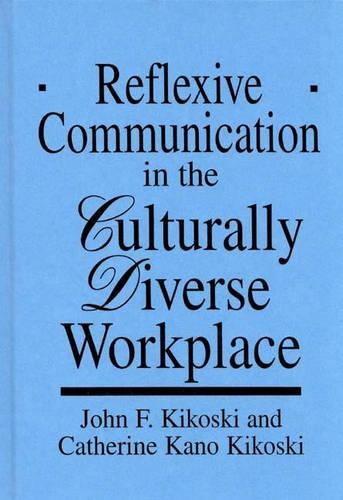
Reflexive Communication in the Culturally Diverse Workplace
(Hardback)
Available Formats
Publishing Details
Reflexive Communication in the Culturally Diverse Workplace
By (Author) John Kikoski
By (author) Catherine Kikoski
Bloomsbury Publishing PLC
Praeger Publishers Inc
22nd July 1996
United States
Classifications
Tertiary Education
Non Fiction
Organizational theory and behaviour
Cultural studies
302.35
Physical Properties
Hardback
240
Width 156mm, Height 235mm
454g
Description
America's rapid and drastically changing demographics pose new challenges to society and particularly to the workplace. Taking as their theme that The only antidote to stereotyping and discrimination is to know each other as individuals, the authors look carefully at the direction in which America is heading demographically and where it will be in the 21st century. They discuss what the workplace will be like and how it will be affected by the characteristics of the people who will comprise it. The essence of the problem, say the authors, is communicationthe face-to-face interaction between people of different ethnicities, races, and genders. They may be speaking to each other but are not being heard. Exploring the relationship between culture, communication and management, this new research in management introduces and applies the theory of 'Reflexive Communication' and the microskills necessary for using it in day-to-day work situations. The authors lay out the patterns of culture-specific values and behaviors of the major demographic groups in the workplacewhite males, women, African-Americans, Hispanics, and Asian Americans. In each of these chapters the authors apply their theory and show step-by-step how individuals within each group can be accessed and trained by the precepts of 'Reflexive Communication'. The book concludes with a thoughtful examination of the future of diversity and diversity training in America and reasserts the need for people of differing cultures to find ways to work together, not only for their own personal benefit, but for the benefit of their workplaces and organizations. The authors lay out the patterns of culture-specific values and behaviors of the major demographic groups in the workplacewhite males, women, African Americans, Hispanics, and Asian Americans. In each of these chapters the authors apply their theory and show step-by-step how individuals within each group can be accessed and trained according to the precepts of 'Reflexive Communication'. The book concludes with a thoughtful examination of the future of diversity training in America and reasserts the need for people of differing cultures to find ways to work together, not only for their own personal benefit, but for the benefit of their workplaces and organizations.
Reviews
"The Kikoskis have written a book full of hope, practical guidance, and great insight. Reflexive Communication is key to understanding and overcoming problems that arise in managing a culturally diverse workforce. Clear and compelling, this book not only foretells the future but leads you into it."-Worth Loomis, Former President, Dexter Corporation President Emeritus, Runsselaer at Hartford Visiting Professor, Hartford Seminary
"This book is about making diversity work. It moves far beyond "diversity is good" and provides clear and sophisticated suggestions for managers. The chapter on the "White Male Communication Paradigm" by itself is worth the price of the book. Diversity is encountered fully by the Kikoskis. This is a fascinating book. Read - enjoy - learn!"-Allen E. Ivey Professor Emeritus, University of Massachusetts, Amherst President, Microtraining Associates, Amherst, Massachusetts
Author Bio
JOHN F. KIKOSKI is Professor of Political Science at Sacred Heart University, Fairfield, Connecticut. For more than 20 years he has taught, published, and given workshops on face-to-face communication in the workplace, and is a past president of the Section on Professional Organization and Development of the American Society for Public Administration. CATHERINE KANO KIKOSKI is Professor and Director of the Graduate Program in Marriage and Family Therapy at Saint Joseph College, West Hartford, Connecticut. A licensed psychologist and family therapist, she has been involved for the past two decades in researching, writing, and teaching in the field of cross-cultural communication.
